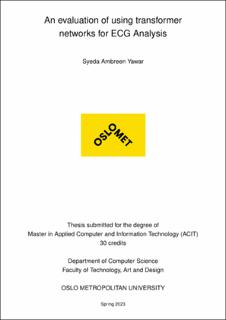An evaluation of using transformer networks for ECG Analysis
Master thesis
Published version
Permanent lenke
https://hdl.handle.net/11250/3101912Utgivelsesdato
2023Metadata
Vis full innførselSamlinger
Sammendrag
Electrocardiogram (ECG) is a simulated recording of heart activity in electrical signals. It carries essential clinical information in the form of amplitude and timing. It is used to monitor and analyze the functionality of the cardiovascular system by doctors in the health care department. The high potential for human error due to skills, knowledge, and workload stress in manual analyzing ECG can lead to morbidity and mortality in patients. Therefore, automatic aids are required that can overcome human errors, eases the load on doctors, and help doctors in the diagnosis of heart diseases. Artificial intelligence-integrated systems for ECG analysis are trained on millions of datasets and have seen more ECGs than doctors can see in their entire careers. Furthermore, it provides results in seconds, and no other factors like environment, workload stress, etc. affect the accuracy of the results. Therefore, AI-integrated ECG analysis are more accurate, quick, and reliable than doctors' manual analysis. Recently, deep learning-based tools have been the great attention as an aid to doctors towards accurate analyzing, annotation, and interpretation of ECG data. In deep learning models, Transformer Networks have become reference models with superior performance on different natural language processing and vision tasks. In this work, an evaluation of transformer networks is provided for the analysis of ECG. For this, two end-to-end deep learning frameworks are implemented for measuring the relevant intervals and amplitudes from the ECGs. The frameworks incorporated the transformer network and the multi-layer perceptron to attend to the information stored in ECG signals and predict the relevant (amplitudes and intervals) values. However, both frameworks use different variants of the structure of the transformer to each other.The first framework utilizes the encoder-only structure while the second utilizes the encoder-decoder structure of the transformer network. To overcome the problem of privacy issues (collecting and sharing among researchers) in health care, the implemented framework is evaluated over a realistic synthetic ECG dataset called DeepFake ECG. According to the training results, the performance of encoder-only beat the performance of encoder-decoder in ECG analysis. This deep learning model can aid doctors to perform heart disease diagnosis and improve the health care system's efficiency.
